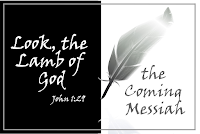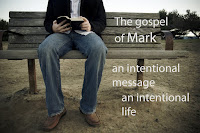The Coming Mesiah - John 1:19-34
 When Jesus came He changed everything by forgiving sin of those who humbly give Him easy access to their hearts and minds.
When Jesus came He changed everything by forgiving sin of those who humbly give Him easy access to their hearts and minds.
Last week we looked at the prologue of John’s gospel, this week we jump right into John’s story and we start with a scene where John the Baptist is being interrogated by a group of Levites and priests sent by ‘the Jews’. Interestingly, John’s father, Zechariah, was a priest and his mother, Elizabeth was of the line of Aaron and therefore John was of the Levite linage. Heritage was important to the Jews, John was ‘one of their boy’s who was ‘going astray’’. The role of the Levites were to guard the temple and maintain doctrinal purity. They also held political power in the Jewish community. The priests served before God in the temple and were to administer the sacrifices for the people. This delegation of priests and Levites were sent to interrogate John about just what in the world was he doing and why.
They must have asked him if he thought he was the Christ because in v20 John picks up the dialogue with “No, "I am not the Christ.".
Christ is the Greek translation for Messiah. When we use the name “Jesus Christ” that was not his first and last name, but his name and title. Like you would say Queen Elizabeth – queen is not her first name but her title, Elizabeth’s role. “Jesus Christ” would be the same as “Jesus Messiah”
Messiah –The anointed one –
What is this role – Messiah? Messiah is a common title in Biblical theology, however if you do a word search for Messiah, the word comes up twice – both in John 1:21 & 4:25
It is kind of like the word “Trinity” that does not show up at all in the Bible and yet is a strong theological foundation of Christianity.
Throughout the late Old Testament period and especially in the inter-testamental period ( the period of 400 years between the Old Testament and New Testament) the hope of a coming Messiah was developed. Primarily because of the unrest and oppression the Jewish people were experiencing from the hands and intentional cultural changes brought on by first the Greeks and then the Romans.
The Messiah was “the Lords Anointed”, someone filled with God’s power and Spirit who would work some saving miracle on behalf of God’s people. The Jewish people frequently thought about Moses as perhaps the ideal messianic model. Not only did he give the people spiritual leadership, but also provided political redemption from Egypt.
It is no accident that in the days of Greek and Roman oppression (a period of over 300 years) the term Messiah (or Christ) was filled with political connotations. The Messiah was viewed as the one who would save their people, their culture, from the abominations of the Romans
Daniel 9:25 speaks of an ‘anointed one’ who will come and rule God’s people (the Jews)
Isa 9:1-6 speaks of a ruler that was to come and provide deliverance from Israel’ s enemies and bring peace, and this decendant of David would rule forever with justice and righteousness under the names “Wonderful Counselor, Mighty God, Everlasting Father, Prince of Peace”
Mic 5:4-5
4 He will stand and shepherd his flock
in the strength of the Lord,
in the majesty of the name of the Lord his God.
And they will live securely, for then his greatness
will reach to the ends of the earth.
5 And he will be their peace.
The Prophet Jeremiah speaks in 23 of a “branch of David” that will deliver the people from wicked leaders and rule God’s people with justice and righteousness and there will be security and blessing for Israel
The prophet Ezekiel prophesied a coming savior 34:22-27
22 I will save my flock, and they will no longer be plundered. I will judge between one sheep and another. 23 I will place over them one shepherd, my servant David, and he will tend them; he will tend them and be their shepherd. 24 I the Lord will be their God, and my servant David will be prince among them. I the Lord have spoken.
25 "'I will make a covenant of peace with them and rid the land of wild beasts so that they may live in the desert and sleep in the forests in safety. 26 I will bless them and the places surrounding my hill. I will send down showers in season; there will be showers of blessing.
The people were looking for a Messiah, someone who would lead them spiritually and politically to a new day that would restore their heritage and culture.
There is something in humanity that looks to the past of the ‘good old days’ and desire to project that into our future days. But the Jewish world was changing – and change is challenging.
The Jews wanted to know of John, - are you the Messiah, and he declares firmly – “NO”
Well then, how about this one- cause we are still trying to figure out who you are and what you are up to. Malachi 4:5 says
"See, I will send you the prophet Elijah before that great and dreadful day of the Lord comes. 6 He will turn the hearts of the fathers to their children, and the hearts of the children to their fathers; or else I will come and strike the land with a curse."
So, are you Elijah? -- “I am not” John says in v 21
How about “The Prophet” - Deut 18:15-19 Moses tells the people that God will raise up another like himself to lead the people and who will speak the words of God, and the people must listen to him and follow him. Someone with the power & humility of Moses. – John answers NO
So who are you? John answers from the Old Testament prophet Isaiah…
Isa 40:3
A voice of one calling:
"In the desert prepare
the way for the Lord;make straight in the wilderness
a highway for our God.
He is a “VOICE”
If Jesus is the WORD John is the voice that draws everyone’s attention to that Word
And he is saying “Prepare the way for the WORD, make straight paths in the wilderness, build a highway for the one coming – God himself”
He is challenging every listener to ready their hearts, their minds for God’s coming to them personally. Create an openness, a willingness to receive him and respond to him. A highway that is going to make him accessable to your life. Start getting yourselves ‘persuadable’ and ‘easily persuadable’
Don’t be stiff necked about this, start now loosening up your lives to be able to accept this Messiah who is coming.
Well the interrogators didn’t want to tackle that message so they redirected their line of questioning. “so your not the Christ, nor Elijah nor the Prophet, so … why are you baptizing people?”
The Jewish people knew about ritual washings for ceremonial cleansing. They did it all the time. In their culture they had things called “Mikvahs” they were basically baptismal pools that they would ceremonially immerse themselves into. Before a man could enter the temple he would take off all his clothes, walk into this pool, submerge himself then walk out and dress in clean clothes. There were lots of Mikvahs at the enterance to the temple. But communities and some homes would also have a mikvah where they would regularly immerse themselves for sacred cleansing.
But Baptism was generally reserved for Gentiles who had converted to Judaism. It was a ceremony that marked a total cleansing symbolizing a threshold that was crossed. It indicated the person was choosing a complete change in life and lifestyle. The Gentile was rejecting their former way of living and adopting a new culture and lifestyle.
John however was calling Jews to be baptized and the interrogating delegation wanted to know – “What is the threshold” what is this new order you are inaugurating? What are you expecting US JEWS to change?
The promise on the horizon – the new order – was not a religion but a person
And John describes him as so great that by comparison he, himself, would be less than a slave.
Untying a sandal thong was a chore never done by disciples for their teacher, rather, it was a chore reserved only for slaves. John says he is unworthy even to do the work of a slave for this One who is coming. This is a measure of Jesus’ greatness.
We go on in verse 29 and John sees Jesus coming and John makes an amazing proclamation
John 1:29 "Look, the Lamb of God, who takes away the sin of the world!
John didn’t know who the Word was until he recognized him as Jesus. One commentator says “John’s knowledge of the coming one was not innate knowledge. It was knowledge that had come to him through revelation – when the Spirit descended on Jesus”
This is John’s understanding of how God works and that is by revelation. True knowledge of God is beyond human reach: it is a gift of divine disclosure, God takes the initiative to reveal himself to us, otherwise we could not know him.
John identifies Jesus as the “Lamb of God, who takes away the sin of the world.” “Lamb of God” is an interesting phrase, while it may be common place in Christian vocabulary, this phrase does not exist anywhere else in the New Testament except here and in verse 1:36.
The crux is to understand what “Lamb” (Gk. Amnos) means. Some would suggest it to be a reference to the Passover sacrifice, which traditionally would be a lamb. However that animal was not termed amnos in the Greek speaking Judaism, but rather “the pascha”. The author John is very interested in seeing Jesus as a Passover sacrifice (we will see when we get to the crucifixion passage 19:31-36) so it wouldn’t be unusual for him to use this concept for Jesus, but the language doesn’t support it.
Another suggestion would look to Isa 53:7 he was led like a lamb to the slaughter, and as a sheep before her shearers is silent,
Or even the lamb of Genesis 22:8 that was provided to Abraham as a substitute sacrifice for Isaac
Or John may have been thinking of the triumphant lamb of Revelation 5
Or John may have been thinking of the daily temple sacrifices when the priest offers a lamb both morning and evening.
We are not entirely sure what John was thinking when he made this extraordinary statement, but one thing is clear, for the Jew, all lamb sacrifices were memorials of deliverance, forgiveness of sin and messianic salvation. It would not be impossible for John to be thinking of the Passover lamb in mind, but possibly much more than that.
The primary thing to keep in mind here is Jesus is offered as a gift provided by God to take away sin.
As a lamb he becomes a sacrificial animal whose death is a substitutionary payment for our sin, this sacrifice “carries away” a condition that is prohibited in the presence of a Holy God.
In verse 30 John comes back to a statement he has previously made (v15).
30 This is the one I meant when I said, 'A man who comes after me has surpassed me because he was before me.
I suspect this is something very much on the mind of John, that he repeats himself, this is the third time he has made the point – the idea that this man who is coming is extraordinary, he is way beyond me, He is from God, He is God Himself
Then he testifies to what he witnessed that day in the Jordan. A remarkable testimony.
I saw the Spirit come down from heaven as a dove and remain on him. And not only that but the one who sent me to baptize with water told me this was going to happen and when I saw it I would know who it was that God had sent – and it was His Son.
The Old Testament expected the Messiah to usher in a day of renewal when the Spirit of God would not only transform Israel (Isa 32:15; Ez 36:26-27; 37:14) but would rest mightily on the Messiah himself. (Isa 11:2, 42:1)
The Spirit of God was common in the Old Testament, but it appeared primarily among designated leaders, ie kings, judges, prophets, and would remain only for a specified time while they did whatever God appointed them to do in that instance.
Here the Sprit descended and remained in Him. This is a permanent anointing and unlike anything witnessed before in Judaism. This is a messianic anointing. Moreover, Jesus is not merely receiving this anointing at his baptism, but he will baptize others in the Holy Spirit as well. Indeed John the Baptist has witnessed something extraordinary, the dawn of a new era in not only Judaism but all humanity.
John says
John 1:33
33 I would not have known him, except that the one who sent me to baptize with water told me, 'The man on whom you see the Spirit come down and remain is he who will baptize with the Holy Spirit.'
Jesus will baptize His followers and command us to baptize as well – calling us to cross a threshold, a new order, a new way of living and we must be ready to receive this because along with this new way of living comes the Holy Spirit to anoint and empower us as His children.
Jesus’ sacrifice as the lamb of God brings deliverance and forgiveness of sin that is complete and eternal but it is for his purposes to prevail in our lives, by our willing choice to embrace Him.
The Point: When Jesus came He changed everything by forgiving sin of those who humbly give Him easy access to their hearts and minds
When Jesus comes, He changes us and the way we live, his baptism is to an entirely new way of living, and John the Baptist is calling us to prepare our hearts and minds for Him.
This morning, can you recognize Jesus as YOUR Lamb of God, who took away your sin, and the sin of the world? Have you crossed that threshold into this new way of living. If so, are you living in the power and anointing of God’s Spirit that is upon you, in you, remaining in you.
Maybe your next step this morning is to trust Jesus to take away your sin and experience the forgiveness of God
Or Perhaps you need to take the next step of baptism and publically say “I am stepping over a threshold of my life” I am living as a follower of Jesus
Or maybe you have done both of those steps but God is pointing out an area of your own life where you need to clear the way for Him to have more access to your heart and mind this morning, you need to make a new highway for God to be present in your life.
Trust Him this morning. Make a path into your life for God to enter in and begin to change you.


Comments